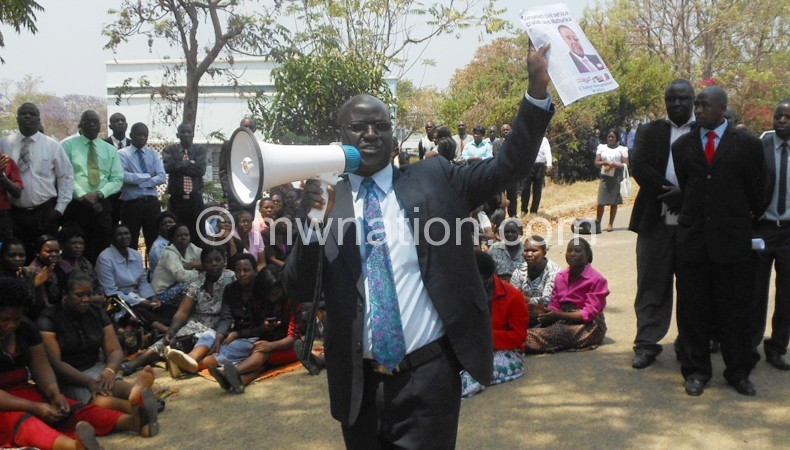Civil servants get pay hike
Malawi Government has backtracked on its earlier proposal to give a 15 percent pay hike to junior civil servants and has since effected an across-the-board increment, pushing the wage bill up by K22 billion ($30 219 780 million).
The development follows an agreement between government and workers representatives—notably Civil Servants Trade Union (CSTU) and Teachers Union of Malawi (TUM).

Initially, Minister of Finance, Economic Planning and Development Goodall Gondwe, in the 2016/17 National Budget Statement read in Parliament on May 27 this year, proposed an additional K19 billion ($26 098 901 million) to cater for salary adjustments and new recruitments, but the civil servants have negotiated an additional K2.5 billion ($3. 5 million).
But the agreed upon salary adjustments will increase the wage bill from the revised K222.7 billion to K264 billion which, according to Treasury, will be 23.3 percent of total expenditure in the K1.4 trillion 2016/17 National Budget.
Treasury has also given the Ministry of Education, Science and Technology (MoEST) an additional K10.9 billion for the recruitment of 10 500 primary school teachers and 466 secondary school teachers for the next 12 months and K2.7 billion to pay the same number of teachers for a period of three months.
MoEST’s wage bil l alone was estimated at K108 billion, including rural teachers’ hardship allowances.
Ministry of Finance spokesperson Nations Msowoya said in an interview yesterday the amount allocated for recruitment and promotion is appearing under the Department of Human Resources Management and Development (DHRMD) vote as approved by Parliament.
According to the Appropriation Act 2016, about K29.4 billion has been allocated to the vote which includes Other Recurrent Transactions (ORT) for DHRMD.
Government is under pressure to maintain the wage bill within acceptable levels, but at the same time not compromise on recruitment of critical cadres such as teachers, doctors, nurses and security officers.
Thus far, government has agreed with the International Monetary Fund (IMF) to ensure that the wage bill is maintained below seven percent of nominal gross domestic product (GDP) by offering a “modest salary increase for lower grades of the civil service”.
However, the agreement which the Government Negotiating Team (GNT) and civi l s e r va n t s ’ representatives agreed on two weeks ago, but effective July 1 2016, indicates that the lowest paid civil servants, grade R to N would get a 20 percent increase with grade M to L getting 13 percent, grade K would get 12 percent and grade J would get 11 percent.
According to the civil service cadres, grade R— which is industrial class— sees the highest increment from about K600 000 annually to K720 000, representing a 20 percent increase.
Grade J in the teaching service is a senior supervisor position and its old annual salary of K1 301 244 would rise to K1 444 380.84, representing a 11 percent increase.
Grades K and L are supervisor and senior clerical positions while Grade M is a clerical or tradesmen position.
The unions have negotiated increments for grades I to P6, who are not considered the lowest paid, of six percent while grade F would get a 4 percent increment.
Grade A to E in which the Chief Secretary, principal secretaries and directors fall, have not been spared a share of the K21 billion cake as they would get a two percent increase.
Also contained in the K22 billion kitty the civil servants have negotiated is K1.8 billion to cater for annual increments normally effected in November, but also starting salaries for general vacancies which will be filled in the course of the year.
While not confirming the minute details of the agreement, CSTU general secretary Madalitso Njolomole yesterday confirmed that after weeks of negotiations, the two parties have agreed that the high cost of living was affecting every cadre of civil servant not just the lowest paid.
“When the minister [of Finance] mentioned 15 percent average for lowest paid civil servants, we protested because everyone is affected by the poor economic conditions prevailing in this country. We considered the living conditions and agreed on this cost of living adjustment,” he said.
Reacting to the development, Economics Association of Malawi (Ecama) president Henry Kachaje said the economy has not yet stabilised and recovered enough to accommodate even a modest salary increase.
However, Kachaje defended the move to demand a salary adjustment considering that the cost of living has gone up, however impractical such an increase might be in the face of plans to reduce civil servant salaries and keeping the wage bill below seven percent.
Earlier, government, through the Department of Statutory Corporations announced a pay increase freeze for parastatals, citing prevailing bad economic environment.
However, later, government offered a 15 percent increment for junior officers in parastatals, a development representatives of workers’ unions in the country’s five water boards protested, demanding an across-the-board hike.





